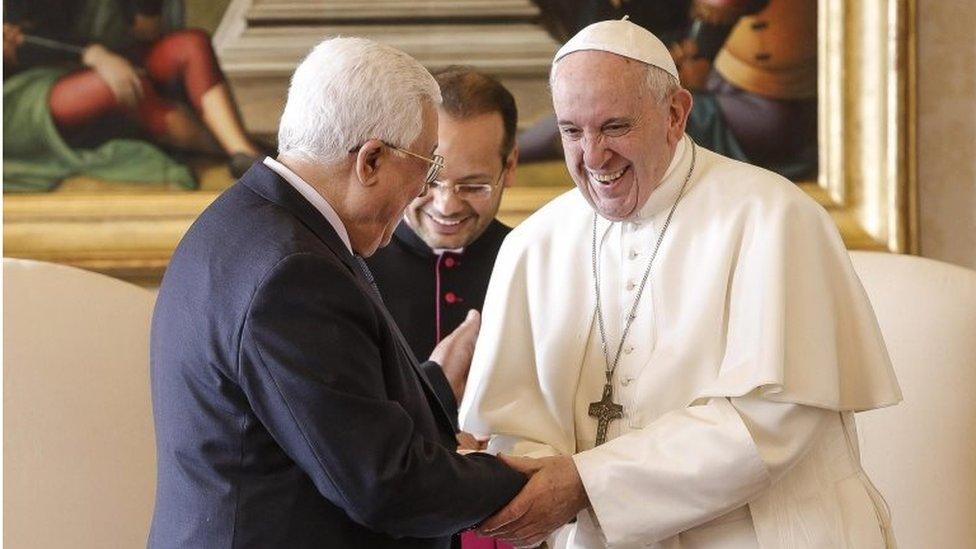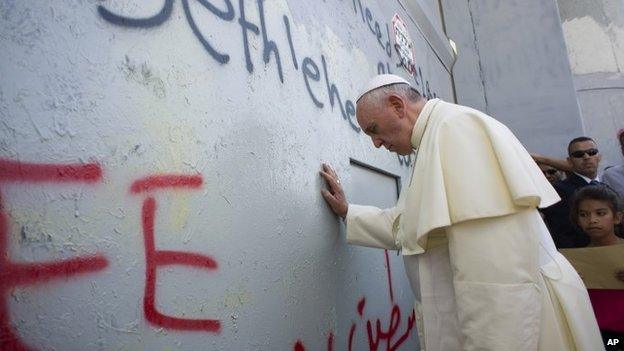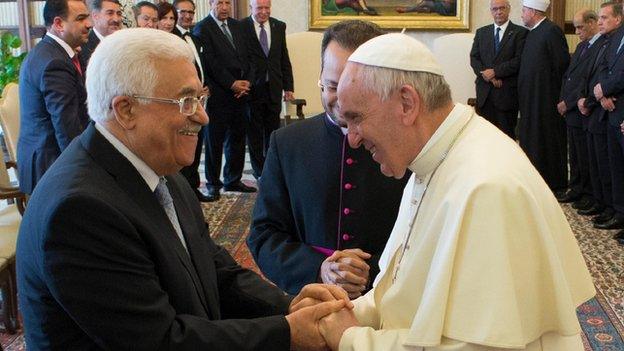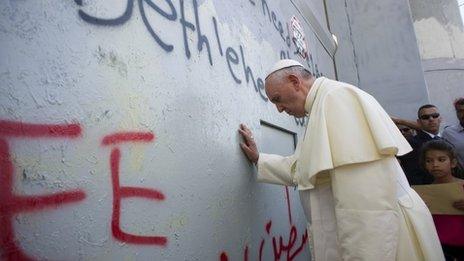Mahmoud Abbas: US embassy move to Jerusalem would hurt peace
- Published

Mahmoud Abbas (L) made the comments after meeting Pope Francis for the third time
Palestinian leader Mahmoud Abbas has warned that peace could suffer if President-elect Donald Trump carries out plans to move the US embassy in Israel from Tel Aviv to Jerusalem.
He spoke at the inauguration of the Palestinian embassy to the Holy See, after meeting Pope Francis.
The Vatican recognised Palestinian statehood a year and a half ago.
The status of Jerusalem is one of the most sensitive and complex issues of the entire Middle East conflict.
Palestinians view East Jerusalem as the capital of their future state but Israel proclaims the entire city as its capital.
On Sunday, France is hosting an international conference in Paris to try to kick-start peace talks between the two sides.
Can Paris summit save fading two-state solution?
Can Jewish settlement issue be resolved?
The Pope has repeatedly supported moves to restart the peace process.
Relations between the Holy See and Palestinian territories were upgraded in 2015 with the signing of a treaty recognising Palestinian statehood - a move that angered Israel.

Significant prize - by James Reynolds, BBC News Rome correspondent
The Palestinians - and the Israelis - are engaged in a constant search for allies. Official recognition from the Pope is a significant prize. Israel already has an embassy to the Holy See. Now the Palestinian leader, Mahmoud Abbas, has opened the new Palestinian embassy.
Pope Francis himself has played a role in the conflict between the Israelis and the Palestinians. In 2014, he visited Israel and the Palestinian West Bank. In the Palestinian town of Bethlehem he even stopped to pray in front of Israel's separation barrier. It's a symbol of protection for Israelis - but of occupation for Palestinians.
Later that year, the Pope invited the Israeli and Palestinian presidents to come to Rome to pray for peace. Now each side has its own permanent official voice at the Vatican.

Israeli relations with the Vatican were further strained after it was reported that Pope Francis described President Abbas as "an angel of peace" during the canonisation ceremony of two Palestinian nuns at the Vatican in 2015. The Vatican later clarified that this was an encouragement to Mr Abbas rather than a description of him.
On Saturday, President Abbas reiterated his concern over President-elect Trump's plan to move the US embassy from Tel Aviv to Jerusalem and said he had written to Mr Trump to warn him of the risks of such a move.
"If this is the decision, to transfer the embassy to Jerusalem, it will not help peace and we hope it doesn't happen," President Abbas told reporters outside the Vatican.
Palestinian officials say the plan would undermine chances of a negotiated peace based on a two-state solution, in which Palestinian and Israeli states would live side-by-side.

Pope Francis delighted his Palestinian hosts by referring to the "state of Palestine" during a three-day visit to the Middle East in 2014
"Not only would this move deprive the United States of all legitimacy in playing a role in conflict resolution, it would also destroy the two-state solution," Mr Abbas was quoted earlier as saying in French paper Le Figaro.
He also said Palestinians may consider "reversing recognition" of Israel if Mr Trump goes ahead with the move.
Israel and the Palestine Liberation Organisation (PLO) recognised each other under the 1993 Oslo agreements.
Sunday's talks in Paris, involving some 70 countries, are to discuss peace in the region and reiterate support for the two-state solution.

Importance of Jerusalem: Key points
There have been numerous rounds of peace talks between Israel and the Palestinians since the early 1990s, with the most recent collapsing in acrimony in April 2014
Palestinian statehood and the status of Jerusalem are among the thorniest issues blocking peace talks
Israel occupied the West Bank and East Jerusalem in the 1967 Middle East war
The Palestinians want East Jerusalem as the capital of their promised future state - but Israel claims the entire city as its undivided capital
The US and many UN member states do not recognise Jerusalem as Israel's capital

French President Francois Hollande has invited President Abbas and Israeli Prime Minister Benjamin Netanyahu to Paris to discuss the outcome of the conference.
Mr Netanyahu, who is not planning to attend, said on Thursday: "It's a rigged conference, rigged by the Palestinians with French auspices to adopt additional anti-Israel stances. This pushes peace backwards."
Tensions between Israel and the international community were heightened last month after the UN passed a resolution denouncing Israel's settlement activity on occupied land.
About 500,000 Jews live in about 140 settlements built since Israel's 1967 occupation of the West Bank and East Jerusalem. The settlements are considered illegal under international law, though Israel disputes this.
Correction: 6 February 2017: This article has been amended to clarify the Pope's comments to President Mahmoud Abbas.
- Published16 May 2015

- Published13 May 2015
